- Home
- Gillian Flynn
Gone Girl: A Novel Page 5
Gone Girl: A Novel Read online
Page 5
The Cape had been good to us. I remember discovering several months in that Amy, my girlfriend, was also quite wealthy, a treasured only child of creative-genius parents. An icon of sorts, thanks to a namesake book series that I thought I could remember as a kid. Amazing Amy. Amy explained this to me in calm, measured tones, as if I were a patient waking from a coma. As if she’d had to do it too many times before and it had gone badly—the admission of wealth that’s greeted with too much enthusiasm, the disclosure of a secret identity that she herself didn’t create.
Amy told me who and what she was, and then we went out to the Elliotts’ historically registered home on Nantucket Sound, went sailing together, and I thought: I am a boy from Missouri, flying across the ocean with people who’ve seen much more than I have. If I began seeing things now, living big, I could still not catch up with them. It didn’t make me feel jealous. It made me feel content. I never aspired to wealth or fame. I was not raised by big-dreamer parents who pictured their child as a future president. I was raised by pragmatic parents who pictured their child as a future office worker of some sort, making a living of some sort. To me, it was heady enough to be in the Elliotts’ proximity, to skim across the Atlantic and return to a plushly restored home built in 1822 by a whaling captain, and there to prepare and eat meals of organic, healthful foods whose names I didn’t know how to pronounce. Quinoa. I remember thinking quinoa was a kind of fish.
So we married on the beach on a deep blue summer day, ate and drank under a white tent that billowed like a sail, and a few hours in, I sneaked Amy off into the dark, toward the waves, because I was feeling so unreal, I believed I had become merely a shimmer. The chilly mist on my skin pulled me back, Amy pulled me back, toward the golden glow of the tent, where the gods were feasting, everything ambrosia. Our whole courtship was just like that.
Boney leaned in to examine Amy. “Your wife is very pretty.”
“She is, she’s beautiful,” I said, and felt my stomach lilt.
“What anniversary today?” she asked.
“Five.”
I was jittering from one foot to another, wanting to do something. I didn’t want them to discuss how lovely my wife was, I wanted them to go out and search for my fucking wife. I didn’t say this out loud, though; I often don’t say things out loud, even when I should. I contain and compartmentalize to a disturbing degree: In my belly-basement are hundreds of bottles of rage, despair, fear, but you’d never guess from looking at me.
“Five, big one. Let me guess, reservations at Houston’s?” Gilpin asked. It was the only upscale restaurant in town. You all really need to try Houston’s, my mom had said when we moved back, thinking it was Carthage’s unique little secret, hoping it might please my wife.
“Of course, Houston’s.”
It was my fifth lie to the police. I was just starting.
AMY ELLIOTT DUNNE
JULY 5, 2008
DIARY ENTRY
I am fat with love! Husky with ardor! Morbidly obese with devotion! A happy, busy bumblebee of marital enthusiasm. I positively hum around him, fussing and fixing. I have become a strange thing. I have become a wife. I find myself steering the ship of conversations—bulkily, unnaturally—just so I can say his name aloud. I have become a wife, I have become a bore, I have been asked to forfeit my Independent Young Feminist card. I don’t care. I balance his checkbook, I trim his hair. I’ve gotten so retro, at one point I will probably use the word pocketbook, shuffling out the door in my swingy tweed coat, my lips painted red, on the way to the beauty parlor. Nothing bothers me. Everything seems like it will turn out fine, every bother transformed into an amusing story to be told over dinner. So I killed a hobo today, honey … hahahaha! Ah, we have fun!
Nick is like a good stiff drink: He gives everything the correct perspective. Not a different perspective, the correct perspective. With Nick, I realize it actually, truly doesn’t matter if the electricity bill is a few days late, if my latest quiz turns out a little lame. (My most recent, I’m not joking: “What kind of tree would you be?” Me, I’m an apple tree! This means nothing!) It doesn’t matter if the new Amazing Amy book has been well and duly scorched, the reviews vicious, the sales a stunning plummet after a limp start. It doesn’t matter what color I paint our room, or how late traffic makes me, or whether our recycling really, truly does get recycled. (Just level with me, New York, does it?) It doesn’t matter, because I have found my match. It’s Nick, laid-back and calm, smart and fun and uncomplicated. Untortured, happy. Nice. Big penis.
All the stuff I don’t like about myself has been pushed to the back of my brain. Maybe that is what I like best about him, the way he makes me. Not makes me feel, just makes me. I am fun. I am playful. I am game. I feel naturally happy and entirely satisfied. I am a wife! It’s weird to say those words. (Seriously, about the recycling, New York—come on, just a wink.)
We do silly things, like last weekend we drove to Delaware because neither of us have ever had sex in Delaware. Let me set the scene, because now it really is for posterity. We cross the state line—Welcome to Delaware!, the sign says, and also: Small Wonder, and also: The First State, and also: Home of Tax-Free Shopping.
Delaware, a state of many rich identities.
I point Nick down the first dirt road I see, and we rumble five minutes until we hit pine trees on all sides. We don’t speak. He pushes his seat back. I pull up my skirt. I am not wearing undies, I can see his mouth turn down and his face go slack, the drugged, determined look he gets when he’s turned on. I climb atop him, my back to him, facing the windshield. I’m pressed against the steering wheel, and as we move together, the horn emits tiny bleats that mimic me, and my hand makes a smearing noise as I press it against the windshield. Nick and I can come anywhere; neither of us gets stage fright, it’s something we’re both rather proud of. Then we drive right back home. I eat beef jerky and ride with bare feet on the dashboard.
We love our house. The house that Amazing Amy built. A Brooklyn brownstone my parents bought for us, right on the Promenade, with the big wide-screen view of Manhattan. It’s extravagant, it makes me feel guilty, but it’s perfect. I battle the spoiled-rich-girl vibe where I can. Lots of DIY. We painted the walls ourselves over two weekends: spring green and pale yellow and velvety blue. In theory. None of the colors turned out like we thought they would, but we pretend to like them anyway. We fill our home with knickknacks from flea markets; we buy records for Nick’s record player. Last night we sat on the old Persian rug, drinking wine and listening to the vinyl scratches as the sky went dark and Manhattan switched on, and Nick said, “This is how I always pictured it. This is exactly how I pictured it.”
On weekends, we talk to each other under four layers of bedding, our faces warm under a sunlit yellow comforter. Even the floorboards are cheerful: There are two old creaky slats that call out to us as we walk in the door. I love it, I love that it is ours, that we have a great story behind the ancient floor lamp, or the misshapen clay mug that sits near our coffeepot, never holding anything but a single paper clip. I spend my days thinking of sweet things to do for him—go buy a peppermint soap that will sit in his palm like a warm stone, or maybe a slim slice of trout that I could cook and serve to him, an ode to his riverboat days. I know, I am ridiculous. I love it, though—I never knew I was capable of being ridiculous over a man. It’s a relief. I even swoon over his socks, which he manages to shed in adorably tangled poses, as if a puppy carried them in from another room.
It is our one-year anniversary and I am fat with love, even though people kept telling and telling us the first year was going to be so hard, as if we were naive children marching off to war. It wasn’t hard. We are meant to be married. It is our one-year anniversary, and Nick is leaving work at lunchtime; my treasure hunt awaits him. The clues are all about us, about the past year together:
Whenever my sweet hubby gets a cold
It is this dish that will soon be sold.
Answer: the tom yum soup
from Thai Town on President Street. The manager will be there this afternoon with a taster bowl and the next clue.
Also McMann’s in Chinatown and the Alice statue at Central Park. A grand tour of New York. We’ll end at the Fulton Street fish market, where we’ll buy a pair of beautiful lobsters, and I will hold the container in my lap as Nick jitters nervously in the cab beside me. We’ll rush home, and I will drop them in a new pot on our old stove with all the finesse of a girl who has lived many Cape summers while Nick giggles and pretends to hide in fear outside the kitchen door.
I had suggested we get burgers. Nick wanted us to go out—five-star, fancy—somewhere with a clockwork of courses and namedropping waiters. So the lobsters are a perfect in-between, the lobsters are what everyone tells us (and tells us and tells us) that marriage is about: compromise!
We’ll eat lobster with butter and have sex on the floor while a woman on one of our old jazz records sings to us in her far-side-of-the-tunnel voice. We’ll get slowly lazy-drunk on good Scotch, Nick’s favorite. I’ll give him his present—the monogrammed stationery he’s been wanting from Crane & Co. with the clean sans-serif font set in hunter green, on the thick creamy stock that will hold lush ink and his writer’s words. Stationery for a writer, and a writer’s wife who’s maybe angling for a love letter or two.
Then maybe we’ll have sex again. And a late-night burger. And more Scotch. Voilà: happiest couple on the block! And they say marriage is such hard work.
NICK DUNNE
THE NIGHT OF
Boney and Gilpin moved our interview to the police station, which looks like a failing community bank. They left me alone in a little room for forty minutes, me willing myself not to move. To pretend to be calm is to be calm, in a way. I slouched over the table, put my chin on my arm. Waited.
“Do you want to call Amy’s parents?” Boney had asked.
“I don’t want to panic them,” I said. “If we don’t hear from her in an hour, I’ll call.”
We’d done three rounds of that conversation.
Finally, the cops came in and sat at the table across from me. I fought the urge to laugh at how much it felt like a TV show. This was the same room I’d seen surfing through late-night cable for the past ten years, and the two cops—weary, intense—acted like the stars. Totally fake. Epcot Police Station. Boney was even holding a paper coffee cup and a manila folder that looked like a prop. Cop prop. I felt giddy, felt for a moment we were all pretend people: Let’s play the Missing Wife game!
“You okay there, Nick?” Boney asked.
“I’m okay, why?”
“You’re smiling.”
The giddiness slid to the tiled floor. “I’m sorry, it’s all just—”
“I know,” Boney said, giving me a look that was like a hand pat. “It’s too strange, I know.” She cleared her throat. “First of all, we want to make sure you’re comfortable here. You need anything, just let us know. The more information you can give us right now, the better, but you can leave at any time, that’s not a problem either.”
“Whatever you need.”
“Okay, great, thank you,” she said. “Um, okay. I want to get the annoying stuff out of the way first. The crap stuff. If your wife was indeed abducted—and we don’t know that, but if it comes to that—we want to catch the guy, and when we catch the guy, we want to nail him, hard. No way out. No wiggle room.”
“Right.”
“So we have to rule you out real quick, real easy. So the guy can’t come back and say we didn’t rule you out, you know what I mean?”
I nodded mechanically. I didn’t really know what she meant, but I wanted to seem as cooperative as possible. “Whatever you need.”
“We don’t want to freak you out,” Gilpin added. “We just want to cover all the bases.”
“Fine by me.” It’s always the husband, I thought. Everyone knows it’s always the husband, so why can’t they just say it: We suspect you because you are the husband, and it’s always the husband. Just watch Dateline.
“Okay, great, Nick,” Boney said. “First let’s get a swab of the inside of your cheek so we can rule out all of the DNA in the house that isn’t yours. Would that be okay?”
“Sure.”
“I’d also like to take a quick sweep of your hands for gun shot residue. Again, just in case—”
“Wait, wait, wait. Have you found something that makes you think my wife was—”
“Nonono, Nick,” Gilpin interrupted. He pulled a chair up to the table and sat on it backward. I wondered if cops actually did that. Or did some clever actor do that, and then cops began doing it because they’d seen the actors playing cops do that and it looked cool?
“It’s just smart protocol,” Gilpin continued. “We try to cover every base: Check your hands, get a swab, and if we could check out your car too …”
“Of course. Like I said, whatever you need.”
“Thank you, Nick. I really appreciate it. Sometimes guys, they make things hard for us just because they can.”
I was exactly the opposite. My father had infused my childhood with unspoken blame; he was the kind of man who skulked around looking for things to be angry at. This had turned Go defensive and extremely unlikely to take unwarranted shit. It had turned me into a knee-jerk suckup to authority. Mom, Dad, teachers: Whatever makes your job easier, sir or madam. I craved a constant stream of approval. “You’d literally lie, cheat, and steal—hell, kill—to convince people you are a good guy,” Go once said. We were in line for knishes at Yonah Schimmel’s, not far from Go’s old New York apartment—that’s how well I remember the moment—and I lost my appetite because it was so completely true and I’d never realized it, and even as she was saying it, I thought: I will never forget this, this is one of those moments that will be lodged in my brain forever.
We made small talk, the cops and I, about the July Fourth fireworks and the weather, while my hands were tested for gunshot residue and the slick inside of my cheek was cotton-tipped. Pretending it was normal, a trip to the dentist.
When it was done, Boney put another cup of coffee in front of me, squeezed my shoulder. “I’m sorry about that. Worst part of the job. You think you’re up to a few questions now? It’d really help us.”
“Yes, definitely, fire away.”
She placed a slim digital tape recorder on the table in front of me. “You mind? This way you won’t have to answer the same questions over and over and over …” She wanted to tape me so I’d be nailed to one story. I should call a lawyer, I thought, but only guilty people need lawyers, so I nodded: No problem.
“So: Amy,” Boney said. “You two been living here how long?”
“Just about two years.”
“And she’s originally from New York. City.”
“Yes.”
“She work, got a job?” Gilpin said.
“No. She used to write personality quizzes.”
The detectives swapped a look: Quizzes?
“For teen magazines, women’s magazines,” I said. “You know: ‘Are you the jealous type? Take our quiz and find out! Do guys find you too intimidating? Take our quiz and find out!’ ”
“Very cool, I love those,” Boney said. “I didn’t know that was an actual job. Writing those. Like, a career.”
“Well, it’s not. Anymore. The Internet is packed with quizzes for free. Amy’s were smarter—she had a master’s in psychology—has a master’s in psychology.” I guffawed uncomfortably at my gaffe. “But smart can’t beat free.”
“Then what?”
I shrugged. “Then we moved back here. She’s just kind of staying at home right now.”
“Oh! You guys got kids, then?” Boney chirped, as if she had discovered good news.
“No.”
“Oh. So then what does she do most days?”
That was my question too. Amy was once a woman who did a little of everything, all the time. When we moved in together, she’d made an intense study of French cooking, displaying
hyper-quick knife skills and an inspired boeuf bourguignon. For her thirty-fourth birthday, we flew to Barcelona, and she stunned me by rolling off trills of conversational Spanish, learned in months of secret lessons. My wife had a brilliant, popping brain, a greedy curiosity. But her obsessions tended to be fueled by competition: She needed to dazzle men and jealous-ify women: Of course Amy can cook French cuisine and speak fluent Spanish and garden and knit and run marathons and day-trade stocks and fly a plane and look like a runway model doing it. She needed to be Amazing Amy, all the time. Here in Missouri, the women shop at Target, they make diligent, comforting meals, they laugh about how little high school Spanish they remember. Competition doesn’t interest them. Amy’s relentless achieving is greeted with open-palmed acceptance and maybe a bit of pity. It was about the worst outcome possible for my competitive wife: a town of contented also-rans.
“She has a lot of hobbies,” I said.
“Anything worrying you?” Boney asked, looking worried. “You’re not concerned about drugs or drinking? I’m not speaking ill of your wife. A lot of housewives, more than you’d guess, they pass the day that way. The days, they get long when you’re by yourself. And if the drinking turns to drugs—and I’m not talking heroin but even prescription painkillers—well, there are some pretty awful characters selling around here right now.”
“The drug trade has gotten bad,” Gilpin said. “We’ve had a bunch of police layoffs—one-fifth of the force, and we were tight to begin with. I mean, it’s bad, we’re overrun.”
“Had a housewife, nice lady, get a tooth knocked out last month over some OxyContin,” Boney prompted.
“No, Amy might have a glass of wine or something, but not drugs.”
Boney eyed me; this was clearly not the answer she wanted. “She have some good friends here? We’d like to call some of them, just make sure. No offense. Sometimes a spouse is the last to know when drugs are involved. People get ashamed, especially women.”

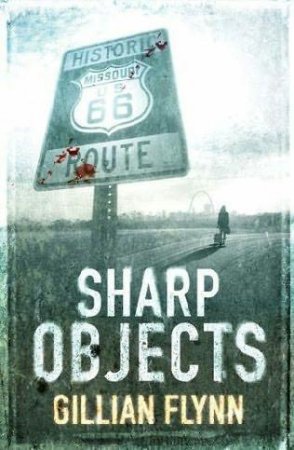 Sharp Objects
Sharp Objects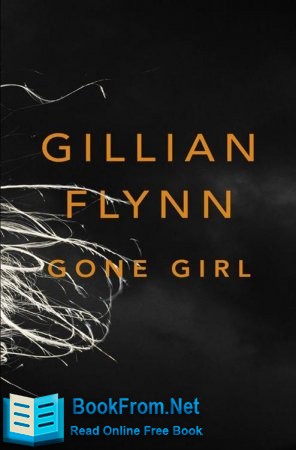 Gone Girl
Gone Girl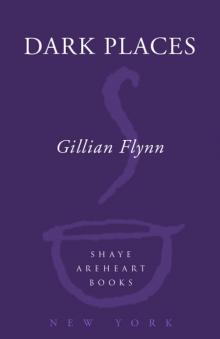 Dark Places
Dark Places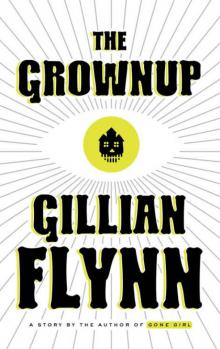 The Grownup
The Grownup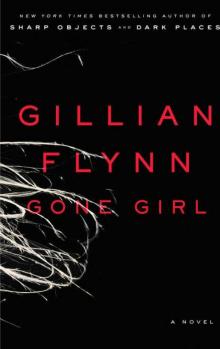 Gone Girl: A Novel
Gone Girl: A Novel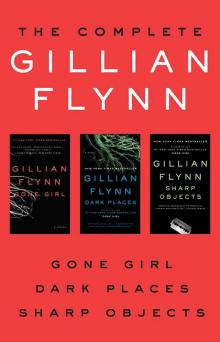 The Complete Gillian Flynn
The Complete Gillian Flynn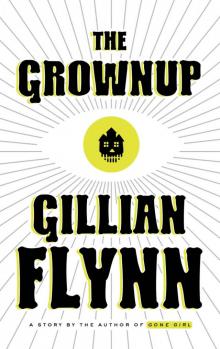 The Grownup: A Story by the Author of Gone Girl (Kindle Single)
The Grownup: A Story by the Author of Gone Girl (Kindle Single)